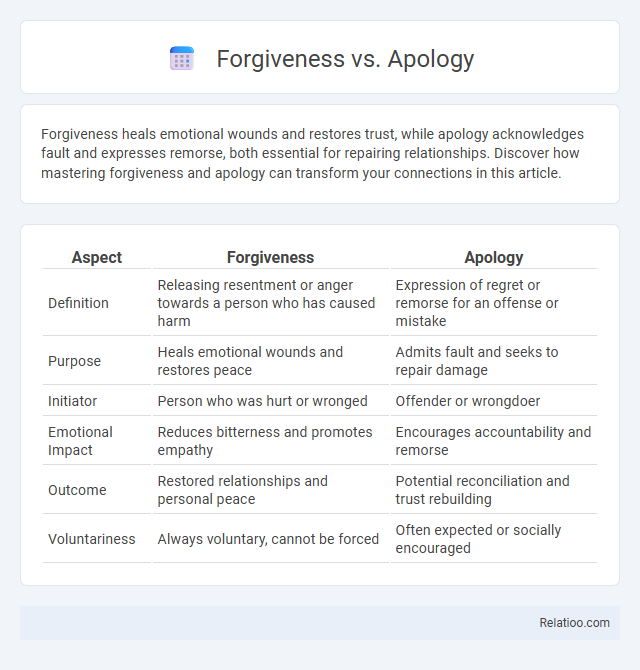Forgiveness heals emotional wounds and restores trust, while apology acknowledges fault and expresses remorse, both essential for repairing relationships. Discover how mastering forgiveness and apology can transform your connections in this article.
Table of Comparison
| Aspect | Forgiveness | Apology |
|---|---|---|
| Definition | Releasing resentment or anger towards a person who has caused harm | Expression of regret or remorse for an offense or mistake |
| Purpose | Heals emotional wounds and restores peace | Admits fault and seeks to repair damage |
| Initiator | Person who was hurt or wronged | Offender or wrongdoer |
| Emotional Impact | Reduces bitterness and promotes empathy | Encourages accountability and remorse |
| Outcome | Restored relationships and personal peace | Potential reconciliation and trust rebuilding |
| Voluntariness | Always voluntary, cannot be forced | Often expected or socially encouraged |
Understanding Forgiveness and Apology
Understanding forgiveness involves recognizing it as a conscious decision to release resentment and anger toward someone who has caused harm, improving emotional well-being and interpersonal relationships. Apology serves as an essential acknowledgment of wrongdoing, expressing remorse and taking responsibility, which can facilitate healing and reconciliation. Together, forgiveness and apology create a foundation for repairing trust and restoring damaged connections.
Key Differences Between Forgiveness and Apology
Forgiveness involves releasing resentment and finding inner peace, while an apology is an acknowledgment of wrongdoing and expression of regret. Your emotional healing depends on forgiveness, which is an internal process, whereas an apology requires the offender's active participation. Repair focuses on actions taken to restore trust and mend relationships, distinct from the personal and communicative aspects of forgiveness and apology.
The Psychology Behind Forgiveness
Forgiveness involves a complex psychological process distinct from apology and repair, where the individual consciously decides to release resentment or anger toward the offender. Research in psychology highlights that forgiveness promotes emotional healing and reduces stress-related symptoms by fostering empathy and understanding rather than condoning the harmful behavior. Neuroimaging studies reveal that forgiveness activates brain areas associated with empathy, compassion, and emotional regulation, reinforcing its role in improving mental health and interpersonal relationships.
The Importance of Offering a Sincere Apology
Offering a sincere apology plays a crucial role in healing emotional wounds and rebuilding trust after a conflict or mistake. Your genuine acknowledgment of wrongdoing validates the feelings of the hurt party and opens the door for forgiveness and meaningful repair of the relationship. Without a heartfelt apology, attempts at repair may lack the emotional impact necessary to restore mutual respect and understanding.
Forgiveness Without an Apology: Is It Possible?
Forgiveness without an apology is possible and often essential for personal healing and emotional well-being, allowing you to release resentment even when acknowledgment from the offender is absent. Psychological research shows that forgiving independently can reduce stress, lower blood pressure, and improve mental health by fostering inner peace and resilience. Authentic forgiveness focuses on your own growth and closure, rather than relying on external validation or repair from the person who caused harm.
Apology Without Expecting Forgiveness
An apology without expecting forgiveness allows you to take full responsibility for your actions while respecting the other person's emotional process. This approach fosters genuine communication by emphasizing empathy and accountability rather than demanding reconciliation. Your honest expression can promote healing and trust, even if forgiveness is not immediately granted.
The Role of Empathy in Both Processes
Empathy plays a crucial role in differentiating forgiveness, apology, and repair by allowing you to deeply understand and acknowledge the emotions of both parties involved. While an apology requires genuine empathy to recognize the harm caused, forgiveness involves empathizing enough to release resentment and foster healing. Repair goes beyond emotional understanding by using empathy to guide actions that rebuild trust and restore the relationship effectively.
Cultural Perspectives on Forgiveness and Apology
Cultural perspectives on forgiveness and apology significantly influence interpersonal dynamics, as collectivist societies often emphasize communal harmony and prioritizing apologies as a way to maintain social cohesion. In contrast, individualistic cultures may view forgiveness as a personal moral choice, valuing direct acknowledgment and accountability in the form of a sincere apology. Understanding these cultural nuances is essential for effective conflict resolution and fostering genuine repair in cross-cultural interactions.
Benefits of Practicing Forgiveness and Apologizing
Practicing forgiveness promotes emotional healing and reduces stress, helping you move beyond resentment and improve overall mental well-being. Apologizing fosters trust and accountability by acknowledging mistakes and validating the feelings of others, which strengthens relationships. Together, forgiveness and apologies create a foundation for repair and reconciliation, enhancing communication and long-term social harmony.
Steps Toward Healing: Integrating Forgiveness and Apology
Forgiveness requires sincere acknowledgment of harm and a genuine apology that validates the injured party's feelings. Repair involves actionable steps to restore trust and make amends, reinforcing the commitment to change behavior. Integrating forgiveness and apology accelerates healing by fostering emotional release and rebuilding relational bonds essential for long-term resilience.

Infographic: Forgiveness vs Apology
 relatioo.com
relatioo.com